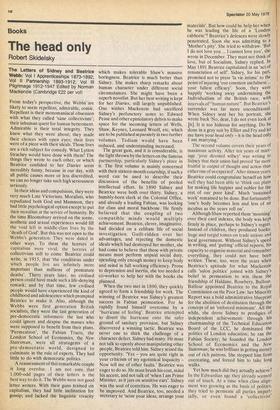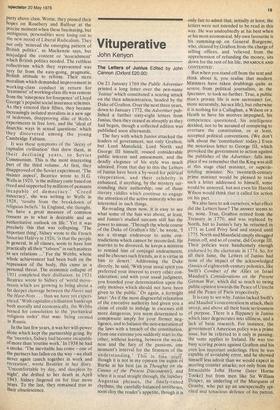Books
The head only
Robert Skidelsky
The Letters of Sidney and Beatrice Webb: Vol I Apprenticeships 1873-1892; Vol II Partnership 1893-1912; Vol III Pilgrimage 1912-1947 Edited by Norman Mackenzie (Cambridge £22 per vol) From today's perspective, the Webbs are likely to seem repellent, admirable, comic. Repellent is their monomaniacal obsession with what they called 'sane collectivism'; their inhuman quest for human betterment. Admirable is their total integrity. They knew what they were about; they made their choices with open eyes; their lives were of a piece with their ideals. Those lives are a rich subject for comedy. What Lytton Strachey would have done with them! The things they wrote to each other, or which Beatrice confided to her Diaries seem incredibly funny, because in our day, with all public causes more or less discredited, we can no longer take such high seriousness seriously.
In their ideas and compulsions, they were very much Late Victorians. Moralists, who repudiated both God and Mammon, they had little psychological option except to put their moralism at the service of humanity. By the time Bloomsbury arrived on the scene, aesthetic and sexual experiences would fill the void left in middle-class lives by the 'death of God'. But this was not open to the Webbs's generation. They were dated in other ways. To them the horrors of capitalism were vivid, the horrors of collectivism still to come. Beatrice could write, in 1915, that 'the conditions under which people live are infinitely more important than millions of premature deaths'. Thirty years later, no civilised person could have made such a life-denying remark; and by that time, few civilised people would have experienced the kind of childhood and adolescence which prompted Beatrice to make it. Also, although the Webbs were first generation British socialists, they were the last generation of pre-democratic reformers: the last Who could ignore and despise the masses who were supposed to benefit from their plans.
'Permeation', the Fabian Tracts, the
London School of Economics, the New Statesman, were all stratagems of a
pre-democratic world, designed to culminate in the rule of experts. They had little to do with democratic politics.
A reassessment of this remarkable couple is long overdue. I am not sure that 1,000-odd pages of their letters is the best way to do it. The Webbs were not good letter writers. With their guns trained On capitalism, they had little inclination for gossip; and lacked the linguistic vivacity
which makes tolerable Shaw's massive boringness. Beatrice is much better than Sidney. She makes sharp remarks about human character under different social circumstances. She might have been a superb novelist. But her best writing is kept for her Diaries, still largely unpublished. One wishes Mackenzie had sacrificed Sidney's perfunctory notes to Edward Pease and other epistolatory debris to make space for the incoming letters of Wells, Shaw, Keynes, Leonard Woolf, etc, which are to be published separately in two further volumes. Tedium would have been reduced, and understanding increased.
The great gain, and it is considerable, is the light thrown by the letters on the famous partnership, particularly Sidney's place in it. The first volume is mainly concerned with their sixteen-month courtship, if such a word can be used to describe their discussion of the benefits of pooled intellectual effort. In 1890 Sidney and Beatrice were both over thirty. Sidney, a humbly-born clerk at the Colonial Office, and already a leading Fabian, was looking for class and moral backbone. He firmly believed that the coupling of two compatible minds would multiply achievement. Beatrice, clever, imaginative, had decided on a celibate life of social investigation. Guilt-ridden over her advantages, and rejecting the domestic ideals which had destroyed her mother, she had come to believe that those with private means must perform unpaid social duty, spending only enough money to keep body and mind in full working efficiency. Prone to depression and inertia, she too needed a co-worker to help her with the books she planned.
When the two met in 1890, they quickly agreed to form a friendship for work. The winning of Beatrice was Sidney's greatest success in Fabian permeation. For he rapidly found himself overcome by a 'hurricane of feeling'. Beatrice attempted to divert the hurricane onto the safer ground of sanitary provision, but Sidney discovered a winning tactic. Beatrice was never one to shirk the challenge of a character defect. Sidney had many. He must not talk so openly about manipulating other people, Beatrice told him. Sidney seized the opportunity. 'Yes you are quite right in your criticism of my egotistical loquacity Now tell me of other faults.' Beatrice was eager to do so. He must brush his coat, mind his accent, and not talk of 'when I am Prime Minister, as it jars on sensitive ears'. Sidney was the soul of contrition. He was eager to be improved. And Beatrice, too, needed a secretary to 'seize your ideas, arrange your
materials'. But how could he help her when he was leading the life of a 'London cabhorse'? Beatrice's defences were slowly penetrated. Soon she was admitting to a 'Mother's pity'. She tried to withdraw: 'But I do not love you ... [cannot love you', she wrote in December. They must not think of love, but of Socialism, Sidney replied. In May 1891 Beatrice capitulated in an 'act of renunciation of self'. Sidney, for his part, promised not to press la vie intime' to the point of injuring 'our common usefulness ... your fullest efficacy'. Soon, they were happily 'working away undermining the Individualism of the British race, with intervals of "human nature". But Beatrice's surrender was far more unconditional. When Sidney sent her his portrait, she wrote back 'No, dear, I do not even look at Tit]. It is too hideous for anything. Do be done in a gray suit by Elliot and Fry and let me have your head only -it is the head onlY I am marrying.'
The second volume covers their years of maximum activity. After ten years of marriage 'your devoted wifsey' was writing lb Sidney that their union had proved 'far more fruitful in output of thought and action than either one of usexpected'. After sixteen years, Beatrice could congratulate herself on how well they had been able to 'think out plans for making life happier and nobler for the rest of our poor kind'. Much 'sustained work' remained to be done. But fortunately 'one's body becomes less and less of all incubus as the years roll on'. Although Shaw reported them 'mooning' over their card indexes, the body was kept firmly in place, perhaps to Sidney's regret. Instead of children, they produced books: huge and turgid tomes on trade unions and local government. Without Sidney's speed in writing, and 'gutting' official reports, his capacity to organise material and remember everything, they could not have been written. These, too, were the years when Beatrice's aptitude for what Mackenzie calls 'salon politics' joined with Sidney's belief in permeation to win them the friendship of Haldane, Rosebery, Balfour. Balfour appointed Beatrice to the Royal Commission on the Poor Law: her MinoritY Report was a bold administrative blueprint for the abolition of destitution through the concept of an 'enforced minimum'. All the while, she drove Sidney to prodigies of independent achievement: through his chairmanship of the Technical Education Board of the LCC, he dominated the politics of London education; he ran the Fabian Society; he founded the London
School of Economics and the New Statesman; he was brilliant in getting money out of rich patrons. She stopped him from overeating, and forced him to take long walks.
Yet how much did they actually achieve? In the Edwardian age they already seemed out of touch. At a time when class alignment was growing as the basis of politics, they tried to permeate all parties impartially, or even found a 'collectivist, Party above class. Worse, they pinned their hopes on Rosebery and Balfour at the Precise moment when these fascinating, but ambiguous, personalities were losing out to the new mood of Liberal Radicalism. They not only 'misread the emerging pattern of British politics', as Mackenzie says, but misjudged the content or 'nourishment' which British politics needed. The ruthless collectivism which they represented was very far from the easy-going, pragmatic, British attitude to reform. Their stern moralism which demanded improvement in Working-class conduct in return for treatment' of working-class ills was remote from the `ninepence for fourpence' of Lloyd .George's populist social insurance schemes. As they entered their fifties, they became Increasingly isolated moralists in a new age of hedonism, disapproving alike of Wells's experiments in free love, and the 'ideal of anarchic ways in sexual questions' which they discovered among the young Cambridge Fabians.
It was these symptoms of the 'decay of capitalist civilisation' that drew them, in their declining years, to Soviet Communism. This is the most interesting Part of the third volume. At first, they disapproved of the Soviet experiment. 'The sinister aspect', Beatrice wrote to H.G. Wells in 1920, 'is the military caste based on creed and supported by millions of peasants incapable of democracy.' Creed autocracy', she was writing to Wells in 1928, 'results from the breakdown of religious beliefs.' In England, she thought, 'we have a great measure of common consent as to what is desirable and an authoritative outlook on life.' Yet it was Precisely this that was collapsing. 'The important thing', Sidney wrote to the French historian Halevy in 1926, 'is that the people In general, in all classes, seem to have lost Practically all their "taboos" in such matters as sex relations ...' For the Webbs, whose whole achievement had been built on the repression of the body, this came as a Personal threat. The economic collapse of 1931 completed their disillusion. In 1931 Beatrice wrote to Sidney of 'world movements which are growing to bring about a far deeper cleavage between the Haves and the Have-Nots ... than we have yet experienced.' With capitalist civilisation bankrupt both morally and economically, the Webbs turned for consolation to the 'puritanical religious order' that twos: being created in Russia.
In the last few years, it was her will-power alone which kept the partnership going. By the 'twenties, Sidney had become incapable (Amore than 'routine work.' In 1938 he had a stroke. 'The inevitable has come —one of the partners has fallen on the way —we shall never again march together in work and recreation', wrote Beatrice in her diary. 'Uncomfortable by day, and sleepless by night', she drifted to her death in April 1943. Sidney lingered on for four more Years. To the last, they remained true to their obsolescence.



































 Previous page
Previous page